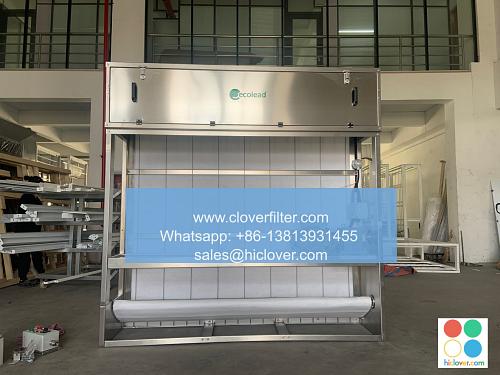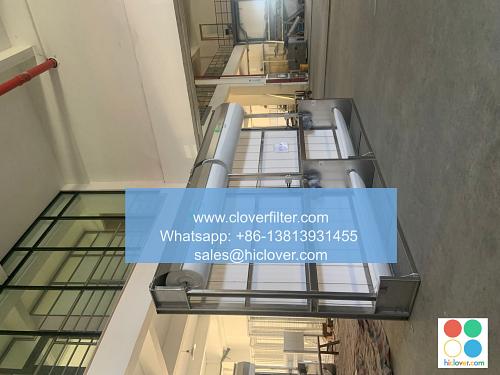Pharmaceutical Manufacturing and Automatic Roll Air Filters: A Guide to Cleanroom Air Filtration

Pharmaceutical manufacturing is a highly regulated industry that requires utmost care and precision to ensure the quality and safety of medicinal products. One crucial aspect of pharmaceutical manufacturing is maintaining a clean and controlled environment, particularly in cleanrooms where sensitive operations take place. Cleanrooms are designed to minimize airborne contaminants, and automatic roll air filters play a vital role in achieving this goal.
In pharmaceutical manufacturing, cleanrooms are classified into different levels based on the permitted number of particles per cubic meter. The most common classification system is the ISO 14644-1 standard, which categorizes cleanrooms from ISO 9 (the least clean) to ISO 4 (the cleanest). To maintain these cleanroom standards, pharmaceutical manufacturers rely on advanced air filtration systems, including automatic roll air filters.
Automatic roll air filters are designed to capture airborne particles, including dust, pollen, and microorganisms, to prevent contamination of pharmaceutical products. These filters are typically installed in the air handling units (AHUs) or ventilation systems of cleanrooms and operate continuously to maintain optimal air quality. The filters are made of a membrane or fiber material that traps particles as small as 0.3 microns, ensuring that the air in the cleanroom remains clean and sterile.
The benefits of using automatic roll air filters in pharmaceutical manufacturing are numerous. Firstly, they provide a high level of filtration efficiency, capturing up to 99.97% of particles as small as 0.3 microns. This ensures that the air in the cleanroom is free from contaminants that could compromise the quality of pharmaceutical products. Secondly, automatic roll air filters are designed to minimize pressure drop, which reduces the energy consumption of the air handling system and lowers operating costs. Finally, these filters are relatively low maintenance, as they can be easily replaced or cleaned, reducing downtime and minimizing the risk of contamination.
In addition to their technical benefits, automatic roll air filters also play a critical role in ensuring regulatory compliance in pharmaceutical manufacturing. The FDA and other regulatory agencies require pharmaceutical manufacturers to maintain strict control over their cleanrooms, including the air quality. By using automatic roll air filters, manufacturers can demonstrate their commitment to quality and compliance, reducing the risk of regulatory action or product recalls.
When selecting automatic roll air filters for pharmaceutical manufacturing, several factors must be considered. Firstly, the filter’s filtration efficiency and particle size retention must be compatible with the cleanroom classification and the type of pharmaceutical products being manufactured. Secondly, the filter’s airflow rate and pressure drop must be compatible with the air handling system’s design and capacity. Finally, the filter’s material and construction must be compatible with the cleanroom’s environmental conditions, including temperature, humidity, and chemical exposure.
In conclusion, automatic roll air filters are a critical component of cleanroom air filtration in pharmaceutical manufacturing. By providing a high level of filtration efficiency, minimizing pressure drop, and reducing maintenance requirements, these filters help pharmaceutical manufacturers maintain optimal air quality, ensure regulatory compliance, and produce high-quality medicinal products.
FAQs
Q: What is the purpose of automatic roll air filters in pharmaceutical manufacturing?
A: The purpose of automatic roll air filters is to capture airborne particles and prevent contamination of pharmaceutical products in cleanrooms.
Q: What are the benefits of using automatic roll air filters in pharmaceutical manufacturing?
A: The benefits include high filtration efficiency, minimal pressure drop, low maintenance requirements, and regulatory compliance.
Q: How do I select the right automatic roll air filter for my pharmaceutical manufacturing cleanroom?
A: Consider the filter’s filtration efficiency, particle size retention, airflow rate, pressure drop, and material compatibility with the cleanroom’s environmental conditions.
Q: Can automatic roll air filters be used in other industries besides pharmaceutical manufacturing?
A: Yes, automatic roll air filters can be used in other industries that require cleanrooms, such as biotechnology, medical devices, and food processing.
Q: How often should automatic roll air filters be replaced or cleaned?
A: The replacement or cleaning frequency of automatic roll air filters depends on the manufacturer’s recommendations, the cleanroom’s classification, and the filter’s usage. Typically, filters are replaced or cleaned every 1-3 months.


